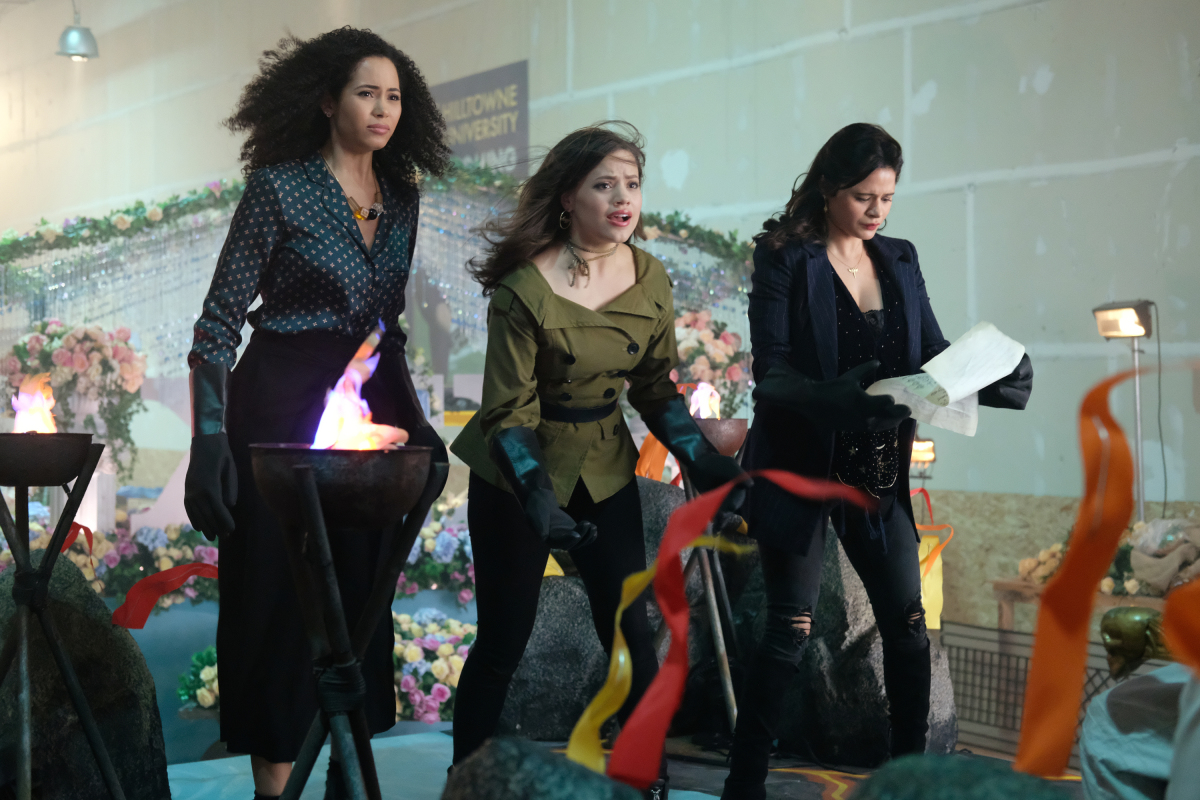From the start, The CW’s rebooted Charmed series has been the subject of much controversy and conversation, some of which I believe has probably helped the show become more successful than some of the other first-season shows that have aired on The CW this year, like Legacies and All-American.
For me, as someone who enjoys but does not revere the original Charmed, I wanted this new reboot to live up to the promises it laid out—that of being a show about representation, feminism, and highlighting different cultures of magic. On the first subject, it’s been a well-documented mess when it comes to how they handled the sisters’ ethnicity. With feminism, they have been on the nose, but I can respect that, especially since that seems to be the way all the other CW shows are going (Supergirl), but when it comes to the matter of highlighting different cultures, the show has been lacking … until this newest episode.
Sisters Mel, Macey, and Maggie attempt to save the soul of a possessed student named Angela, who, in the pilot, was put in a coma after making harassment allegations against a professor who ended up being a demon. She has now awoken as a powerful demon who would bring forth the Source of All Evil, and Elders tell the girls that the only thing they can do to stop it is to kill Angela.
Mel, who knew Angela before her possession and knew their mother wanted to help the young girl, decides that she wants to perform an exorcism to try to save what is left of Angela’s soul. Despite some reluctance from the team, they eventually all come together, and it leads to a spell manifesting in the Book of Shadows, a Santería spell written in Spanish.
Okay, let’s pause here. What is Santería?
Santería is an Afro-Cuban religion that developed in the Spanish colonies within the Carribean, among the descendants of West African slaves. Santería means the “worship of saints” and is influenced by Catholicism. While it is Cuban in origin, it also practiced in Puerto Rico, the Dominican Republic, Venezuela, Panama, Colombia and of course, the United States. The mixture of Yoruba beliefs and Catholicism is embedded in the history of slavery within the North American world. A lot for the rituals revolve around cleansing and healing, which makes sense in regards to its use as an exorcism spell in Charmed.
But what does it mean to incorporate Santería into Charmed, considering all we know about what the show has promised? Well, the first thing we need to clarify is that Santería and Brujería and Wicca are not the same, nor are they interchangeable. Haitian Vodou, Cuban Santería, Brazilian Candomblé, and Umbanda all have specific historical and cultural roots that cannot just be thrown together.
One of the things the series highlighted about its diverse writer’s room was that they had a “real Latinx witch” in writer Marcos Luevanos, who is Mexican American. However, that doesn’t mean that he has been taught Santería, and it also matters when you consider that this is an Afro-Cuban/Afro-Latinx faith with no Afro-Latinx actors portraying the characters. It also solidifies that each of these characters is meant to have some Latinx heritage, possibly Cuban, even though, again, only Mel is played by a Latinx actress, and we’ve seen Mel rep a Puerto Rican flag. It does highlight the African heritage of the other two sisters, but it makes me wish that the series would get to really address where the girls come from culturally, because it does matter. Latin identity is not interchangeable and should be at least consistent within the universe.
That said, this episode really highlighted, overall, what I have wanted to enjoy about this rebooted Charmed series in the first place. I really enjoy the actresses, and I love the feminist slant of the show—the last episode normalizing Macey’s virginity, the steady character development of Maggie’s maturity, and the leadership displayed by Mel, along with her awesome romance with Niko.
There’s a lot of good in the Charmed reboot—a lot of clunk, but some solid good stuff, too. A lot of the problems come from being a reboot of a series that, at least in its first three-and-a-half seasons, was a really fun show with some solid moments. Charmed 2018 should have always just been an original series, not a reboot, but since this is where it is, I hope that it will use this episode as the start of giving its witches heritage and roots that are more than just speaking Spanish and a PR flag—especially when they’re going use religion and magic that is based deeply in culture and heritage.
Also, for the record, I’m aware that the original Charmed loved to appropriate other cultures’ deities and magic for the sake of plot, and it was tacky af when they did it and one of the reasons the show doesn’t hold up at times—that and the massive Cole-sized plot holes. I’m fine with this reboot being imperfect, but I am going to hold it to the standards that it set up for itself.
How are you finding Charmed the reboot?
(image: Robert Falconer/The CW)
Want more stories like this? Become a subscriber and support the site!
—The Mary Sue has a strict comment policy that forbids, but is not limited to, personal insults toward anyone, hate speech, and trolling.—










Published: Nov 5, 2018 04:03 pm